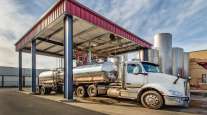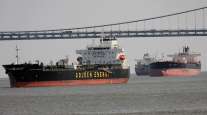Cap-and-Trade Will Raise Price of Diesel, ATA’s Windsor Says
This story appears in the Oct. 26 print edition of Transport Topics.
WASHINGTON — The first vice chairwoman of American Trucking Associations joined a pair of Republican senators to decry the climate legislation being debated in Congress, saying it will amount to a huge tax increase on fuel.
“The proposed cap-and-trade solution will simply increase the cost of diesel fuel while failing to reduce our emissions,” said Barbara Windsor, ATA first vice chairwoman and president of Hahn Transportation Inc. “The reason that the proposed cap-and-trade legislation will not reduce carbon emissions from our trucks is that trucking is not a discretionary user of fuel.”
Earlier this year, the House passed a bill aimed at reducing greenhouse gases through a system of capping emissions and allowing companies to trade unused allowances. The Senate Committee on Environment and Public Works is set to take up its version of the bill this week.
Windsor spoke here Oct. 21 with Sens. Kay Bailey Hutchison (R-Texas) — the ranking Republican on the Senate Commerce Committee — and Christopher “Kit” Bond (R-Mo.).
Hutchison, who released a report with Bond, said the Waxman-Markey climate change bill passed by the House would result in a “$3.6 trillion tax” on American fuel users.
She said the bill would increase gasoline costs by a total of $2 trillion, diesel fuel by $1.3 trillion and jet fuel by $330 billion.
The report said these costs would be incurred over a period of 35 years, beginning in 2015, with the measure adding 14 cents a gallon to the cost of diesel that year and rising to 70 cents a gallon by 2050.
Windsor said that while higher fuel costs may drive some to use either more fuel-efficient vehicles or more alternative fuels, “These options are not currently available for the trucking industry,” and therefore a cap-and-trade system “is not something that our industry can support or our economy can afford.”
If fuel costs rise because of legislation, Windsor warned, the ultimate cost would be borne by consumers.
“Any substantial fuel price increase imposed both directly or indirectly on this industry will increase the price of nearly every consumer good,” she said.
“Our working families, our ranchers, our truckers . . . are going to have higher costs,” Hutchison said.
Bond said the “multi-trillion gas tax on the American people . . . will kill American jobs.”
“Times are tough enough as it is,” said Bond, the top Republican on the Senate Appropriations Committee’s subcommittee that oversees transportation. “Why would we inflict the same kind of pain we all felt at the pump last year when gasoline prices went so high?”
Bond and Hutchison argued that action by the United States to cut carbon emissions won’t curb global warming because other countries, specifically China and India, have said they will not cut emissions.
However, Bond said he “support[ed] cutting carbon emissions.”
“We can and we must do so without killing jobs,” Bond said, highlighting low-carbon biofuels as one possible path forward.
Hutchison said even if efforts were made to exempt trucking companies and other businesses from the cost of the bill, it would be hard to shield them from its effects.
“The major burden of this falls on refiners,” she said. “And it is the refiners that are going to have to pass along this tax” to consumers.
Several groups, including ATA, released letters expressing opposition to the cap-and-trade measure.
The American Highway Users Alliance called the results of the Hutchison-Bond study “shocking” and decried the fact that “none of the funds raised from motorists would be spent on road improvements.”
The group said, “Excluding fuels from the cap would be a step in the right direction.” It noted that Europe does not subject fuels to its cap-and-trade program.
The National Black Chamber of Commerce and the National Federation of Independent Business also released letters opposing the cap-and-trade measure.




